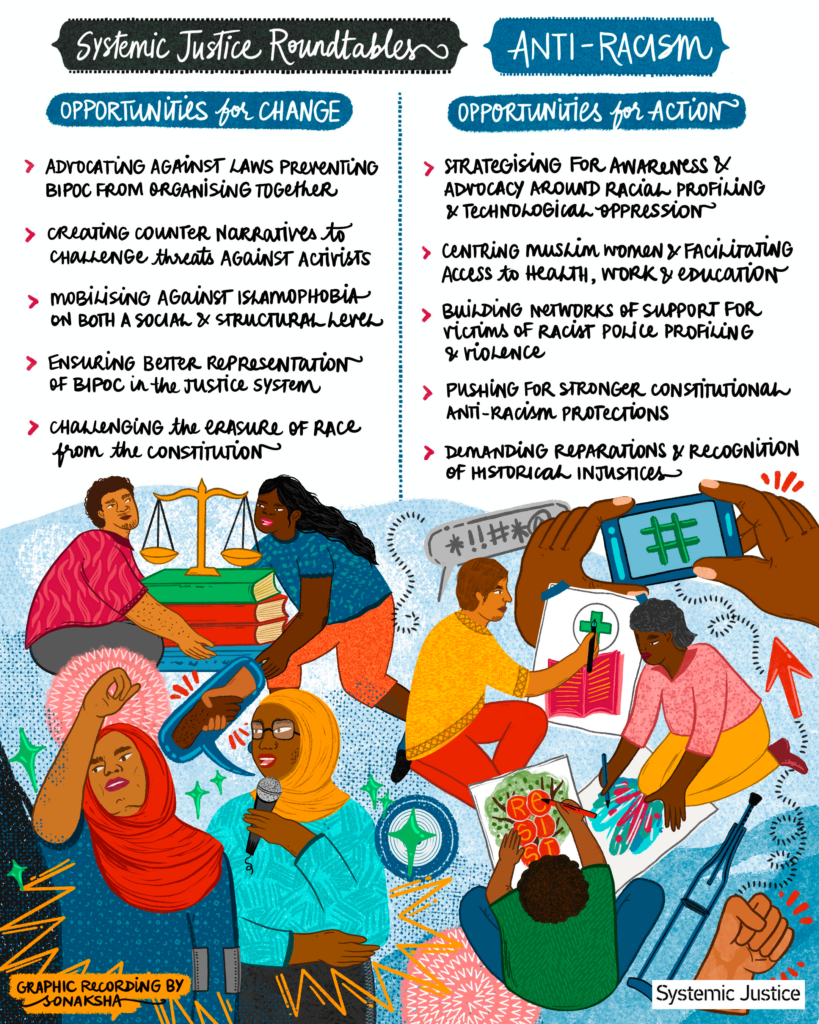“Solidarity has been precluded – so we need to build it”
In Europe, being racialised is a part of everyday life for everyone. Racialisation, as a social construct, can take place on the grounds of ethnicity, skin colour, religion, and a myriad of other factors. For many this results in marginalisation, stereotyping, exploitation, exclusion, invisibilisation, and other forms of unjust treatment across all areas of life.

With racism embedded in the processes, institutions, and the very fabric of our societies, there is hardly a topic imaginable that would be out of scope for a roundtable conversation on anti-racism.
And the conversations we had with 15 activists from across Europe fighting this fight on different fronts, including in the education system, housing, law enforcement, migration, technology, employment and climate justice, were indeed very rich, cutting across a number of the other thematic conversations in the roundtable series.
Recurring themes over the two afternoons included:
- The pervasive nature of profiling: Roma, migrant, Black, Muslim, East Asian and other communities are being targeted with profiling by the police, institutions in the labour market, and welfare systems. In this context, the increased use of algorithmic decision-making, which often is not visible, is of great concern.
- The failure to enforce existing protections: Where legislation and regulation exists to protect the rights of racialised groups, it is often not implemented, rendering these protections a paper tiger.
- The active erasure of race by government legislation and policy: There is an active policy in a number of European countries to erase race not only as a protected class from the Constitution, but also from the public debate. The refusal to collect ethnicity data was flagged by a number of participants as a significant obstacle to demonstrating the injustices occurring as a result of racist policies and practice (while we have to be mindful to limit its potential harm) and demanding change of the state’s gaslighting on race. One participant said, “when we talk about institutional racism, we are told it doesn’t exist. And then we cannot have any conversation with the institutions who are making decisions for us. How do we work with this?”
- “Colonial forgetfulness”: This was the succinct way in which one activist captured how governments in Europe are failing to recognise historic injustices including genocide, fail to set up reparations mechanisms, and do not meaningfully include colonial history in education curriculums.
The added challenges for those with intersecting identities came up across the conversations. For example, the intersection of Muslim and queer identities demonstrated how existing support structures were too weak: “We tend to speak about isolation as an effect of Islamophobia, but we also see that the little infrastructure a Muslim has in a society already rejecting them is further lost when their queerness becomes part of their identity.” The necessity of dealing with racism existing within communities was also underlined: “Racism is not just unipolar but it intersects in so many ways and we hurt each other. It is important to eradicate that within our communities as well. The goal is to love each other more.”
With a long list of challenges, there were also many opportunities for action identified to make change happen:
- Combatting racial profiling, including awareness raising and advocacy around a “know your rights” campaign
- Creating greater awareness of the ways in which technology and data-driven tools are used in these processes
- Creating programmes and partnerships that centre Muslim women, health work and education so they have the tools and resources to take back their power
- Developing test cases to have legislation tested against Constitutional anti-racism protections
- Taking legislators to court for adopting racist legislation, and institutions for implementing it.
With so many challenges to face, we should not forget to centre solidarity and mutual care. In the words of one participant: “I think building a community that loves and cares for the place it lives in, and reaches out to others, is a priority, but often falls through the net. Building collective care is something we cannot do enough of.”
